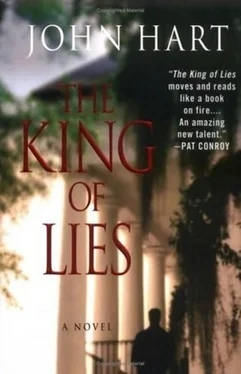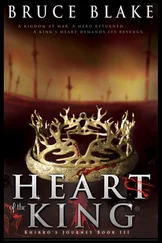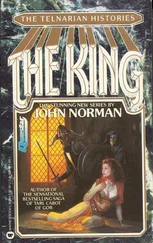The judge was the same older woman who’d given such heartfelt condolences to me on the day after my father’s body had been discovered. Even now her eyes were not unkind. I looked from her to Douglas, who seemed uncertain for a moment. But then he turned my way, and he straightened to a more predatory stance when he saw me watching. There would be no help there; he was committed, and would fight me every step of the way.
The judge spoke, and even though she spoke softly, her words were an avalanche in the silence. “Bailiff,” she commanded. “Remove Mr. Pickens’s handcuffs, please.”
A murmur ran through the double row of attorneys seated before the bar. Douglas leaned into the prosecution table.
“I object, Your Honor. The defendant is accused of murder.”
The judge cut him off. “Are you suggesting that attorney Pickens presents some physical threat to this court?” Her mockery was thinly masked, and I saw a faint blush creep into the district attorney’s neck.
“The defendant is in custody. The defendant is accused of murdering his own father.”
“The defendant is a member of this bar! He will be treated as such until such time as he is proven guilty. Do I make myself clear?”
I felt a lump in my throat and an overwhelming gratitude for her words.
“Yes, Your Honor,” the DA said. “Perfectly clear.”
“Good. Bailiff, remove the cuffs.” The bailiff stepped forward and I held out my hands. The cuffs fell away. I wanted to thank her but could only nod.
The judge looked at me more closely. “Will counsel approach the bench?” she said. I hesitated, unsure if I was included in her summons. “That means you, too, Mr. Pickens,” she said. I rounded the table, nearly brushing shoulders with the DA, and together we approached the bench. We had barely arrived when Douglas addressed the judge in a harsh whisper.
“I protest again, Your Honor. This man is here as a defendant, not as a lawyer. This display is undermining my position in this courtroom and in this case.”
The judge leaned forward. “And I have made my position very clear on this, as well. Unlike you, Mr. DA, I will await the evidence before I convict this man, in my mind or in any other manner. He has served as an officer of this court for ten years, and I am not willing to pretend otherwise.”
“I want my objection on the record.”
“Fine. On the record. But this is my courtroom, and I will run it as I see fit. Mr. Pickens will not be treated like a common street thug.”
“Justice is supposed to be blind, Your Honor.”
“Blind but not stupid,” the judge responded. Then she looked directly at me. “And not without some feeling.”
“Thank you, Your Honor,” I managed to say.
She studied my face for long seconds before speaking. “How did you come by that black eye, Mr. Pickens?”
My fingers moved of their own accord, touching the swollen purple flesh beneath my left eye. “Nothing serious, Your Honor. A disagreement with another inmate. Earlier this morning.”
“Bailiff?” She turned her eyes on the bailiff.
He cleared his throat. “One of the prisoners was trying to intimidate him, Your Honor. But just verbally. Mr. Pickens started it.”
“That’s not the entire story, Your Honor.”
She looked back down at me. “Would you like to elaborate?”
“It’s not important.” I thought of the inmate across the pod. Although I’d never represented him, I’d seen him in and around court for years. He was a drug addict and a wife beater. He’d come straight for me as soon as the cell doors opened and we lined up for breakfast.
The judge, however, continued to hold my eyes, and it was clear that she wanted an answer, so I shrugged. “He wanted my orange juice, Your Honor.”
She turned her hawkish eyes on the district attorney. “You assured me this man would be kept out of the general population,” she said, and looking at her intent features, I realized something. She had signed the arrest warrant. She felt responsible.
“I did, Your Honor. I cannot control events inside the jail.”
Again her eyes found mine; they moved over my face, and in them I saw a profound sadness.
“Very well,” she said. “That will do.”
We returned to our respective places and the proceeding continued. The judge advised me of the charges against me, first-degree murder, and informed me of my right to an attorney.
“Do you wish to have an attorney to represent you, Mr. Pickens?”
“No, Your Honor.” At my words, a ripple moved through the lawyers assembled behind me, and I had another revelation. They wanted the case, each one of them; it would be a high-profile one, with lots of press. Television interviews, newspaper, radio-even a loss would make a reputation for the attorney who represented me. A victory and the attorney might succeed Ezra himself. “I intend to represent myself,” I said. The last thing I wanted was another person prying for a truth better left uncovered.
“Sign the waiver,” I was told. A bailiff handed me the form wherein I waived my right to court-appointed counsel. This was a mere formality. Only the indigent qualified for state-sponsored lawyers. I signed the form and the bailiff passed it up.
Now we came to the crux of the matter. Normally, this would have concluded a defendant’s first appearance. Later, he would face a probable-cause hearing, wherein the state carried the burden of convincing a judge that sufficient probable cause existed to bind the defendant over to superior court, there to stand trial for whatever felony charge he faced. Once past probable cause, a person could request bail, but all of this took time. And there was one significant problem, and I knew of only one way around it.
“Your Honor,” I said. “I move for an expedited bail hearing.”
Douglas surged to his feet. “I object, Your Honor. I most strenuously object.”
“Sit down,” the judge said, exasperation clear on her withered features. “Of course you object.” She turned her attention to me, laced her fingers, and leaned into her words. “This is very unusual, Mr. Pickens. You know that as well as I. There are procedures to be followed. Steps. We’ll need to have the probable-cause hearing. Your case will have to be bound over to superior court.” She paused, as if embarrassed by her lecture. Clearly she was puzzled.
“I waive probable cause,” I said, and my words generated a windstorm of conversation among the lawyers seated behind me. The judge leaned back, as surprised as the rest. No defense attorney going to trial waives probable cause. The state has to show its case at the probable-cause hearing. Not all of it, necessarily, but the broad strokes. It’s a perfect opportunity to probe for strengths and weaknesses. Beyond that, there is also the possibility that the judge will find insufficient probable cause and dismiss the charges. I knew this, of course, but I knew something else, as well. Douglas would object to any local judge hearing the matter. Too much bias, he’d claim. The judge would have to recuse. Another judge would be brought in, someone from out of county. And that would take time, time in jail, time behind bars. It could be days.
Gradually, the buzz of conversation faded and the courtroom settled again into near-perfect silence.
“Are you aware of the ramifications of your request?” the judge asked, rustling beneath her robes. “The probable-cause hearing is one of the cornerstones of procedural due process. I am loath to proceed at this point, Mr. Pickens. I fear that your judgment may be clouded.”
I focused on a point beyond the judge and looked neither right nor left as I spoke. “Shall I renew my motion, Your Honor?”
She sighed, and her words descended into the courtroom as if weighted down with regret. “Very well, Mr. Pickens. Let the record show that the defendant has waived his right to a hearing on probable cause and moves this Court for an expedited bail hearing.” She raised her voice as Douglas came to his feet. “A motion that this Court is inclined to grant.”
Читать дальше












